-
 Bitcoin
Bitcoin $103,376.9419
-0.85% -
 Ethereum
Ethereum $2,598.4775
-1.67% -
 Tether USDt
Tether USDt $1.0000
-0.01% -
 XRP
XRP $2.5553
-0.35% -
 BNB
BNB $653.0322
-1.78% -
 Solana
Solana $176.2492
-1.29% -
 USDC
USDC $0.9999
-0.01% -
 Dogecoin
Dogecoin $0.2338
-1.97% -
 Cardano
Cardano $0.7979
-3.00% -
 TRON
TRON $0.2777
2.53% -
 Sui
Sui $3.9239
-2.13% -
 Chainlink
Chainlink $16.9247
-2.14% -
 Avalanche
Avalanche $25.1374
-0.80% -
 Stellar
Stellar $0.3048
-2.66% -
 Shiba Inu
Shiba Inu $0.0...01579
-2.70% -
 Hedera
Hedera $0.2065
-4.17% -
 Hyperliquid
Hyperliquid $25.0900
-3.88% -
 Toncoin
Toncoin $3.2669
-3.25% -
 UNUS SED LEO
UNUS SED LEO $8.7996
0.88% -
 Bitcoin Cash
Bitcoin Cash $404.0757
-1.34% -
 Polkadot
Polkadot $5.0143
-2.64% -
 Litecoin
Litecoin $100.2313
-2.24% -
 Pi
Pi $0.9551
-19.08% -
 Monero
Monero $344.1473
0.88% -
 Pepe
Pepe $0.0...01387
-5.38% -
 Bitget Token
Bitget Token $4.7281
-1.70% -
 Dai
Dai $0.9999
-0.02% -
 Ethena USDe
Ethena USDe $1.0004
-0.06% -
 Uniswap
Uniswap $6.6265
-6.29% -
 Bittensor
Bittensor $451.7666
-1.69%
How to choose a mining pool? Is a large mining pool or a small mining pool better?
Choosing the right mining pool impacts profitability; consider pool size, fees, reliability, security, and location. Large pools offer consistency, while small pools may yield larger payouts.
May 14, 2025 at 11:49 pm

Choosing the right mining pool is a crucial decision for any cryptocurrency miner. The choice between a large mining pool and a small mining pool can significantly impact your mining experience and profitability. In this article, we will explore the factors to consider when selecting a mining pool and discuss the advantages and disadvantages of both large and small pools.
Understanding Mining Pools
Before diving into the specifics of choosing a mining pool, it's important to understand what a mining pool is and how it functions. A mining pool is a group of miners who combine their computational resources to increase their chances of solving the cryptographic puzzles required to validate transactions and mine new blocks on a blockchain. By working together, miners in a pool can earn a more consistent income than they would mining solo.
Factors to Consider When Choosing a Mining Pool
When selecting a mining pool, several key factors should be taken into account to ensure you make the best decision for your mining operations.
Pool Size and Hash Rate
The size of a mining pool is often measured by its total hash rate, which represents the combined computational power of all miners in the pool. A larger pool typically has a higher hash rate, which means it can solve blocks more frequently. However, this also means that the rewards are distributed among more miners, potentially resulting in smaller individual payouts.
On the other hand, a smaller pool has a lower hash rate, which means it may take longer to solve blocks. However, when a smaller pool does solve a block, the rewards are shared among fewer miners, potentially leading to larger individual payouts.
Fees and Payout Structure
Another important factor to consider is the fee structure of the mining pool. Different pools charge different fees, which can range from 1% to 3% of your mining rewards. It's essential to understand the fee structure and how it impacts your overall profitability.
Additionally, payout structures can vary between pools. Some pools use a proportional payout system, where rewards are distributed based on the number of shares contributed by each miner. Others may use a Pay Per Share (PPS) system, which provides a fixed payout for each share submitted, regardless of whether the pool solves a block.
Reliability and Uptime
The reliability and uptime of a mining pool are crucial factors to consider. A pool that frequently goes offline or experiences technical issues can significantly impact your mining operations. Look for pools with a strong track record of uptime and reliability to ensure consistent mining performance.
Security and Reputation
The security and reputation of a mining pool should not be overlooked. A reputable pool will have robust security measures in place to protect your mining rewards and personal information. Research the pool's history and read reviews from other miners to gauge its reputation and trustworthiness.
Geographical Location and Server Proximity
The geographical location of a mining pool's servers can impact your mining efficiency. Choosing a pool with servers that are geographically closer to your mining rig can reduce latency and improve your overall mining performance. Consider the server locations of different pools when making your decision.
Large Mining Pools vs. Small Mining Pools
Now that we've covered the key factors to consider when choosing a mining pool, let's explore the advantages and disadvantages of both large and small pools.
Advantages of Large Mining Pools
- More consistent payouts: Large pools solve blocks more frequently, resulting in more consistent payouts for miners.
- Lower variance: The high hash rate of large pools reduces the variance in mining rewards, making it easier to predict your income.
- Better support and resources: Large pools often have more resources to invest in customer support, technical infrastructure, and security measures.
Disadvantages of Large Mining Pools
- Smaller individual payouts: With more miners sharing the rewards, individual payouts may be smaller compared to smaller pools.
- Centralization concerns: Very large pools can control a significant portion of the network's hash rate, raising concerns about centralization and potential 51% attacks.
Advantages of Small Mining Pools
- Larger individual payouts: When a small pool solves a block, the rewards are distributed among fewer miners, potentially resulting in larger individual payouts.
- Supporting decentralization: By choosing a smaller pool, you contribute to the decentralization of the network, which is a core principle of many cryptocurrencies.
- More personal experience: Smaller pools may offer a more personal and community-oriented experience for miners.
Disadvantages of Small Mining Pools
- Less consistent payouts: Smaller pools solve blocks less frequently, which can result in less consistent payouts for miners.
- Higher variance: The lower hash rate of small pools can lead to higher variance in mining rewards, making it more challenging to predict your income.
- Limited resources: Smaller pools may have fewer resources to invest in customer support, technical infrastructure, and security measures.
How to Join a Mining Pool
Once you've decided on the type of mining pool that best suits your needs, the next step is to join the pool. Here's a step-by-step guide on how to join a mining pool:
- Choose a mining pool: Based on the factors discussed earlier, select a mining pool that aligns with your preferences and mining goals.
- Create an account: Visit the mining pool's website and create an account. You'll typically need to provide an email address and set up a password.
- Set up your mining software: Download and install the mining software recommended by the pool. Configure the software with the pool's server address, your username, and any other required settings.
- Start mining: Once your software is set up, start your mining rig and begin contributing to the pool's hash rate. Your mining rewards will be credited to your account based on the pool's payout structure.
Monitoring and Managing Your Mining Pool Experience
After joining a mining pool, it's essential to monitor and manage your mining operations to ensure optimal performance and profitability.
- Track your mining statistics: Regularly check your mining statistics on the pool's dashboard to monitor your hash rate, shares submitted, and rewards earned.
- Adjust your mining settings: Based on your mining performance and the pool's payout structure, you may need to adjust your mining settings to optimize your earnings.
- Stay informed about pool updates: Keep an eye on the mining pool's announcements and updates to stay informed about any changes that may impact your mining operations.
- Consider diversifying your mining pools: To mitigate the risks associated with any single pool, consider diversifying your mining operations across multiple pools.
Frequently Asked Questions
Q: Can I switch between mining pools easily?
A: Yes, you can switch between mining pools relatively easily. Most mining software allows you to change the pool settings without reinstalling the software. However, keep in mind that you may need to set up a new account and transfer your mining rewards when switching pools.
Q: How do I know if a mining pool is trustworthy?
A: To determine if a mining pool is trustworthy, research the pool's history, read reviews from other miners, and look for any reported security incidents or issues. A reputable pool will have a strong track record of reliability, transparency, and security.
Q: Is it better to join a mining pool that supports multiple cryptocurrencies?
A: Joining a mining pool that supports multiple cryptocurrencies can be beneficial if you want to mine different coins or switch between them based on profitability. However, make sure the pool has a strong reputation and reliable performance for each supported cryptocurrency.
Q: Can I mine solo instead of joining a mining pool?
A: Yes, you can mine solo instead of joining a mining pool. However, solo mining typically results in less consistent payouts and higher variance in mining rewards. Joining a mining pool can provide more predictable income and a more collaborative mining experience.
Disclaimer:info@kdj.com
The information provided is not trading advice. kdj.com does not assume any responsibility for any investments made based on the information provided in this article. Cryptocurrencies are highly volatile and it is highly recommended that you invest with caution after thorough research!
If you believe that the content used on this website infringes your copyright, please contact us immediately (info@kdj.com) and we will delete it promptly.
- Arctic Pablo Coin (APC) is the Next Big Meme Coin with Explosive Presale Potential
- 2025-05-15 00:25:13
- Bitcoin Solaris Enters Phase 3 of Its Public Token Presale, Prepares to Launch Nova App
- 2025-05-15 00:25:13
- XRP: Can the Momentum Continue Above Resistance?
- 2025-05-15 00:20:12
- The Sui blockchain SUI $3.65 2024-05-14
- 2025-05-15 00:20:12
- Tether Has Just Invested Nearly Half a Billion Dollars in Bitcoin to Launch a New Institutional Management Company
- 2025-05-15 00:15:13
- From Unlock to Utility: The Triggers Behind EIGENLayer Price Momentum
- 2025-05-15 00:15:13
Related knowledge
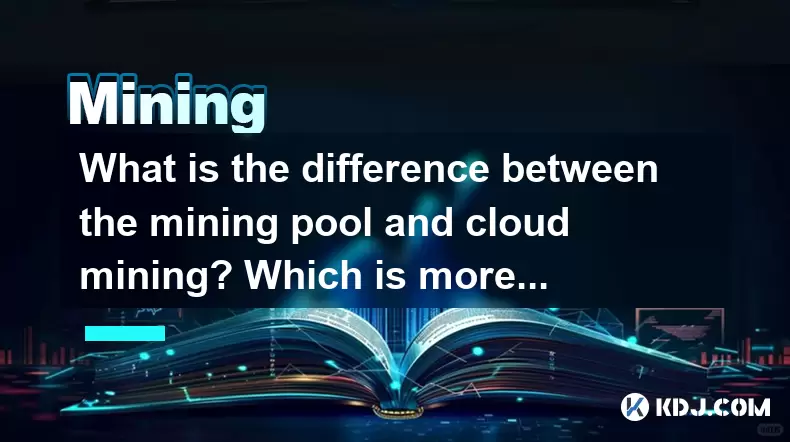
What is the difference between the mining pool and cloud mining? Which is more suitable for novices?
May 14,2025 at 08:56pm
Mining in the cryptocurrency world refers to the process of verifying transactions and adding them to the blockchain, which in turn releases new coins as a reward. Two popular methods of participating in this process are through mining pools and cloud mining. Both have their own set of characteristics, advantages, and disadvantages. This article aims to...
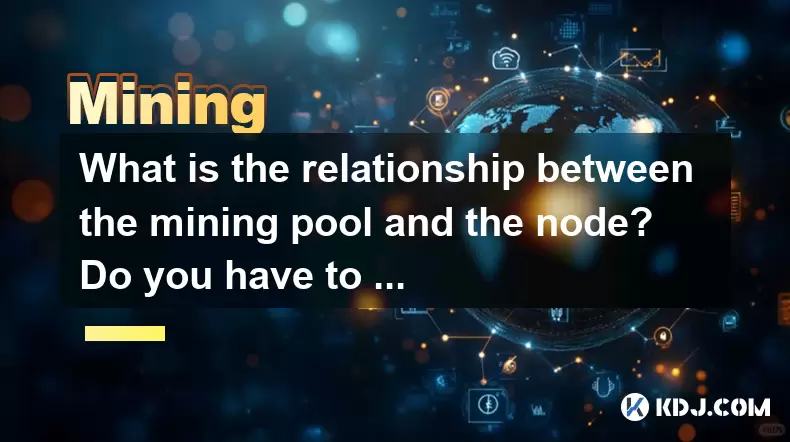
What is the relationship between the mining pool and the node? Do you have to rely on the mining pool?
May 14,2025 at 08:36pm
The relationship between a mining pool and a node in the cryptocurrency ecosystem is intricate and fundamental to understanding how blockchain networks operate. A mining pool is a group of miners who work together to solve complex mathematical problems to validate transactions and add them to the blockchain. On the other hand, a node is a computer conne...

How to choose a mining pool? Is a large mining pool or a small mining pool better?
May 14,2025 at 11:49pm
Choosing the right mining pool is a crucial decision for any cryptocurrency miner. The choice between a large mining pool and a small mining pool can significantly impact your mining experience and profitability. In this article, we will explore the factors to consider when selecting a mining pool and discuss the advantages and disadvantages of both lar...
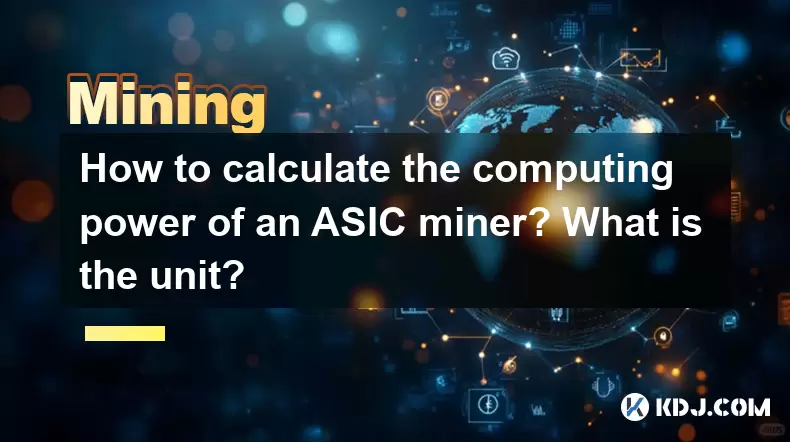
How to calculate the computing power of an ASIC miner? What is the unit?
May 14,2025 at 11:56pm
How to Calculate the Computing Power of an ASIC Miner? What is the Unit? Understanding the computing power of an ASIC miner is crucial for anyone involved in cryptocurrency mining. This article will guide you through the process of calculating the computing power of an ASIC miner, explaining the units used, and providing detailed steps to ensure you hav...
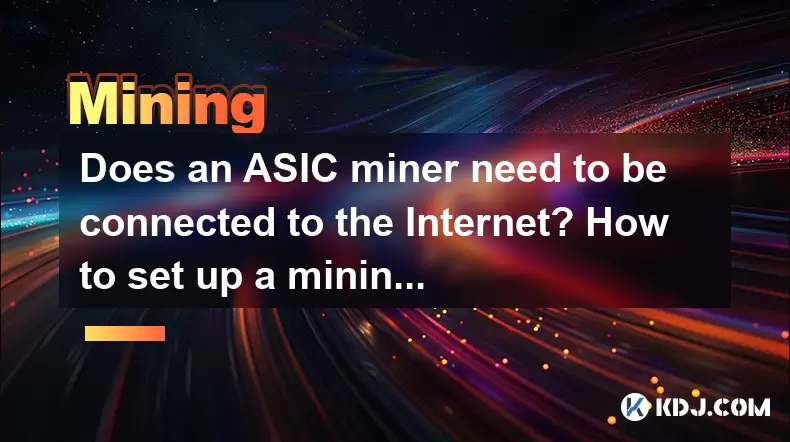
Does an ASIC miner need to be connected to the Internet? How to set up a mining pool?
May 14,2025 at 10:28pm
Does an ASIC Miner Need to Be Connected to the Internet?ASIC miners, or Application-Specific Integrated Circuit miners, are specialized hardware designed to mine cryptocurrencies like Bitcoin. One common question among miners is whether these devices need an internet connection to operate effectively. The short answer is yes, an ASIC miner does need to ...
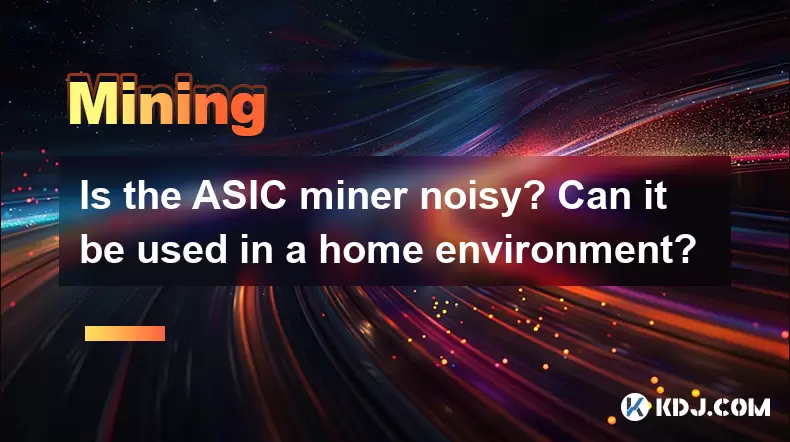
Is the ASIC miner noisy? Can it be used in a home environment?
May 14,2025 at 07:28pm
The noise level of ASIC miners and their suitability for home environments is a common concern for many cryptocurrency enthusiasts looking to mine at home. ASIC miners, or Application-Specific Integrated Circuit miners, are specialized hardware designed for the efficient mining of cryptocurrencies like Bitcoin. These devices are known for their high per...

What is the difference between the mining pool and cloud mining? Which is more suitable for novices?
May 14,2025 at 08:56pm
Mining in the cryptocurrency world refers to the process of verifying transactions and adding them to the blockchain, which in turn releases new coins as a reward. Two popular methods of participating in this process are through mining pools and cloud mining. Both have their own set of characteristics, advantages, and disadvantages. This article aims to...

What is the relationship between the mining pool and the node? Do you have to rely on the mining pool?
May 14,2025 at 08:36pm
The relationship between a mining pool and a node in the cryptocurrency ecosystem is intricate and fundamental to understanding how blockchain networks operate. A mining pool is a group of miners who work together to solve complex mathematical problems to validate transactions and add them to the blockchain. On the other hand, a node is a computer conne...

How to choose a mining pool? Is a large mining pool or a small mining pool better?
May 14,2025 at 11:49pm
Choosing the right mining pool is a crucial decision for any cryptocurrency miner. The choice between a large mining pool and a small mining pool can significantly impact your mining experience and profitability. In this article, we will explore the factors to consider when selecting a mining pool and discuss the advantages and disadvantages of both lar...

How to calculate the computing power of an ASIC miner? What is the unit?
May 14,2025 at 11:56pm
How to Calculate the Computing Power of an ASIC Miner? What is the Unit? Understanding the computing power of an ASIC miner is crucial for anyone involved in cryptocurrency mining. This article will guide you through the process of calculating the computing power of an ASIC miner, explaining the units used, and providing detailed steps to ensure you hav...

Does an ASIC miner need to be connected to the Internet? How to set up a mining pool?
May 14,2025 at 10:28pm
Does an ASIC Miner Need to Be Connected to the Internet?ASIC miners, or Application-Specific Integrated Circuit miners, are specialized hardware designed to mine cryptocurrencies like Bitcoin. One common question among miners is whether these devices need an internet connection to operate effectively. The short answer is yes, an ASIC miner does need to ...

Is the ASIC miner noisy? Can it be used in a home environment?
May 14,2025 at 07:28pm
The noise level of ASIC miners and their suitability for home environments is a common concern for many cryptocurrency enthusiasts looking to mine at home. ASIC miners, or Application-Specific Integrated Circuit miners, are specialized hardware designed for the efficient mining of cryptocurrencies like Bitcoin. These devices are known for their high per...
See all articles
























































































